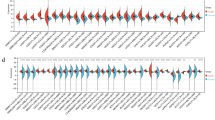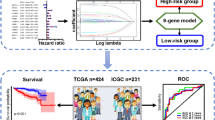Abstract
Background
The evidence obtained from experimental studies suggests the tumor-suppressive effects of vitamin D by controlling the differentiation, proliferation, and apoptosis in cancerous cells. Furthermore, the deregulation of genes involved in vitamin D metabolism has been reported in several types of cancer.
Methods
In the present study, we investigated the expression level of vitamin D metabolic pathway genes, including VDR, CYP3A4, RXRα, and GC, in colorectal cancer (CRC) samples compared with the adjacent tissues by using quantitative RT-PCR.
Results
The results indicated significant downregulation of CYP3A4 and VDR genes in CRC tissues compared with the adjacent control tissues (p < 0.01). RXRA and GC expression levels did not show any significant alteration among the studied samples. Moreover, a positive correlation was observed between the expression level of CYP3A4 and VDR genes (p < 0.0001). ROC curve analysis also revealed the potential diagnostic power of CYP3A4 and VDR genes in CRC samples.
Conclusion
Reduction in the expression of both CYP3A4 and VDR plays an important role in CRC due to the possible impairment in vitamin D metabolism. Further studies concerning the relationship between the expression of these genes and colorectal cancer pathogenesis and treatment are recommended.



Similar content being viewed by others
Data availability
The data supporting this study's findings are available from the corresponding author upon reasonable request.
References
Sawicki T, Ruszkowska M, Danielewicz A, Niedźwiedzka E, Arłukowicz T, Przybyłowicz KE (2021) A review of colorectal cancer in terms of epidemiology, risk factors, development, symptoms and diagnosis. Cancers 13(9):2025
Sung H, Ferlay J, Siegel RL, Laversanne M, Soerjomataram I, Jemal A et al (2021) Global cancer statistics 2020: GLOBOCAN estimates of incidence and mortality worldwide for 36 cancers in 185 countries. CA: Cancer J Clin 71(3):209–249
Rawla P, Sunkara T, Barsouk A (2019) Epidemiology of colorectal cancer: incidence, mortality, survival, and risk factors. Przeglad Gastroenterologiczny 14(2):89
Dolatkhah R, Somi MH, Bonyadi MJ, Asvadi Kermani I, Farassati F, Dastgiri S (2015) Colorectal cancer in Iran: molecular epidemiology and screening strategies. J Cancer Epidemiol 2015:1–10
Hong SN (2018) Genetic and epigenetic alterations of colorectal cancer. Intest Res 16(3):327–337. https://doi.org/10.5217/ir.2018.16.3.327
Jeon S-M, Shin E (2018) Exploring vitamin D metabolism and function in cancer. Exp Mol Med 50(4):1–14
Boughanem H, Canudas S, Hernandez-Alonso P, Becerra-Tomás N, Babio N, Salas-Salvadó J et al (2021) Vitamin D intake and the risk of colorectal cancer: an updated meta-analysis and systematic review of case-control and prospective cohort studies. Cancers 13(11):2814
Sadeghi H, Kamaliyan Z, Mohseni R, Sahebi U, Nazemalhosseini-Mojarad E, Aghaei N et al (2021) Dysregulation of vitamin D synthesis pathway genes in colorectal cancer: a case-control study. J Clin Lab Anal 35(2):e23617
Afshan FU, Masood A, Nissar B, Chowdri NA, Naykoo NA, Majid M et al (2021) Promoter hypermethylation regulates vitamin D receptor (VDR) expression in colorectal cancer-A study from Kashmir valley. Cancer Genet 252–253:96–106. https://doi.org/10.1016/j.cancergen.2021.01.002
Sadeghi H, Nazemalhosseini-Mojarad E, Sahebi U, Fazeli E, Azizi-Tabesh G, Yassaee VR et al (2021) Novel long noncoding RNAs upregulation may have synergistic effects on the CYP24A1 and PFDN4 biomarker role in human colorectal cancer. J Cell Physiol 236(3):2051–2057
Sun H, Wang C, Hao M, Sun R, Wang Y, Liu T et al (2016) CYP24A1 is a potential biomarker for the progression and prognosis of human colorectal cancer. Hum Pathol 50:101–108. https://doi.org/10.1016/j.humpath.2015.11.008
Yi C, Huang C, Wang H, Wang C, Dong L, Gu X et al (2020) Association study between CYP24A1 gene polymorphisms and cancer risk. Pathol Res Pract 216(1):152735. https://doi.org/10.1016/j.prp.2019.152735
Egan JB, Thompson PA, Ashbeck EL, Conti DV, Duggan D, Hibler E et al (2010) Genetic polymorphisms in vitamin D receptor VDR/RXRA influence the likelihood of colon adenoma recurrence. Can Res 70(4):1496–1504
Huang G-L, Chen Q-X, Ma J-J, Sui S-Y, Wang Y-N, Shen D-Y (2019) Retinoic acid receptor α facilitates human colorectal cancer progression via Akt and MMP2 signaling. Onco Targets Ther 12:3087
van Eijk M, Boosman RJ, Schinkel AH, Huitema ADR, Beijnen JH (2019) Cytochrome P450 3A4, 3A5, and 2C8 expression in breast, prostate, lung, endometrial, and ovarian tumors: relevance for resistance to taxanes. Cancer Chemother Pharmacol 84(3):487–499
Wang Z, Schuetz EG, Xu Y, Thummel KE (2013) Interplay between vitamin D and the drug metabolizing enzyme CYP3A4. J Steroid Biochem Mol Biol 136:54–58
Bouillon R, Schuit F, Antonio L, Rastinejad F (2020) Vitamin D binding protein: a historic overview. Front Endocrinol 10:910
Anic GM, Weinstein SJ, Mondul AM, Männistö S, Albanes D (2014) Serum vitamin D, vitamin D binding protein, and risk of colorectal cancer. PLoS ONE 9(7):e102966
Poynter JN, Jacobs ET, Figueiredo JC, Lee WH, Conti DV, Campbell PT et al (2010) Genetic variation in the vitamin D receptor (VDR) and the vitamin D–binding protein (GC) and risk for colorectal cancer: results from the Colon Cancer Family Registry. Cancer Epidemiol Prev Biomark 19(2):525–536
Li Z, Jia Z, Gao Y, Xie D, Wei D, Cui J et al (2015) Activation of vitamin D receptor signaling downregulates the expression of nuclear FOXM1 protein and suppresses pancreatic cancer cell stemness. Clin Cancer Res 21(4):844–853
Sana S, Kayani MA (2021) Role of Vitamin D deficiency and mRNA expression of VDR and RXR in haematological cancers. Mol Biol Rep 48(5):4431–4439
Evans S, Nolla J, Hanfelt J, Shabahang M, Nauta RJ, Shchepotin IB (1998) Vitamin D receptor expression as a predictive marker of biological behavior in human colorectal cancer. Clin Cancer Res 4(7):1591–1595
Saccone D, Asani F, Bornman L (2015) Regulation of the vitamin D receptor gene by environment, genetics and epigenetics. Gene 561(2):171–180
Thomas M, Sylvester P, Newcomb P, Longman R (1999) Vitamin D receptor expression in colorectal cancer. J Clin Pathol 52(3):181–183
Kacevska M, Robertson GR, Clarke SJ, Liddle C (2008) Inflammation and CYP3A4-mediated drug metabolism in advanced cancer: impact and implications for chemotherapeutic drug dosing. Expert Opin Drug Metab Toxicol 4(2):137–149
Gervasini G, García-Martín E, Ladero JM, Pizarro R, Sastre J, Martínez C et al (2007) Genetic variability in CYP3A4 and CYP3A5 in primary liver, gastric and colorectal cancer patients. BMC Cancer 7(1):1–7
Kumarakulasingham M, Rooney PH, Dundas SR, Telfer C, Melvin WT, Curran S et al (2005) Cytochrome p450 profile of colorectal cancer: identification of markers of prognosis. Clin Cancer Res 11(10):3758–3765
Dhaini HR, Thomas DG, Giordano TJ, Johnson TD, Biermann JS, Leu K et al (2003) Cytochrome P450 CYP3A4/5 expression as a biomarker of outcome in osteosarcoma. J Clin Oncol 21(13):2481–2485
Pavek P, Pospechova K, Svecova L, Syrova Z, Stejskalova L, Blazkova J et al (2010) Intestinal cell-specific vitamin D receptor (VDR)-mediated transcriptional regulation of CYP3A4 gene. Biochem Pharmacol 79(2):277–287
Roizen JD, Li D, O’Lear L, Javaid MK, Shaw NJ, Ebeling PR et al (2018) CYP3A4 mutation causes vitamin D-dependent rickets type 3. J Clin Investig 128(5):1913–1918
Andersen SW, Shu XO, Cai Q, Khankari NK, Steinwandel MD, Jurutka PW et al (2017) Total and free circulating vitamin D and vitamin D-binding protein in relation to colorectal cancer risk in a prospective study of African Americans. Cancer Epidemiol Biomark Prev 26(8):1242–1247
Gibbs DC, Bostick RM, McCullough ML, Um CY, Flanders WD, Jenab M et al (2020) Association of prediagnostic vitamin D status with mortality among colorectal cancer patients differs by common, inherited vitamin D-binding protein isoforms. Int J Cancer 147(10):2725–2734
Zhang F, Meng F, Li H, Dong Y, Yang W, Han A (2011) Suppression of retinoid X receptor alpha and aberrant β-catenin expression significantly associates with progression of colorectal carcinoma. Eur J Cancer (Oxf, Engl: 1990). 47(13):2060–2067
Wasiewicz T, Piotrowska A, Wierzbicka J (2018) Antiproliferative activity of non-calcemic vitamin D analogs on human melanoma lines in relation to VDR and PDIA3 receptors. Int J Mol Sci 19(9):2583
Ozawa S, Miura T, Terashima J, Habano W (2021) Cellular irinotecan resistance in colorectal cancer and overcoming irinotecan refractoriness through various combination trials including DNA methyltransferase inhibitors: a review. Cancer Drug Resist (Alhambra, Calif) 4(4):946–964
Nallani SC, Goodwin B, Buckley AR, Buckley DJ, Desai PB (2004) Differences in the induction of cytochrome P450 3A4 by taxane anticancer drugs, docetaxel and paclitaxel, assessed employing primary human hepatocytes. Cancer Chemother Pharmacol 54(3):219–229
Acknowledgements
This study was financially supported by the Research Department of the School of Medicine, Shahid Beheshti University of Medical Sciences (Pajoohan code: 26158).
Funding
The study was financially supported by the “Research Department of the School of Medicine, Shahid Beheshti University of Medical Sciences” (Pajoohan code: 26158).
Author information
Authors and Affiliations
Contributions
HS, and RM contributed to the study conception and design. Material preparation, data collection and analysis were performed by ENM and MRG. HS wrote the first draft of the manuscript. RM and VH revised the final version of the manuscript. All authors read and approved the final manuscript.
Corresponding author
Ethics declarations
Conflict of interest
The authors report no conflict of interest associated with this manuscript.
Ethical approval
This research was conducted in compliance with the ethical principles of the Helsinki Declaration and under the protocols of the Ethics Committee of Shahid Beheshti University of Medical Sciences (IR.SBMU.MSP.REC.1400.141).
Informed consent
Informed consent was taken from all the patients who participated in this study.
Additional information
Publisher's Note
Springer Nature remains neutral with regard to jurisdictional claims in published maps and institutional affiliations.
Rights and permissions
Springer Nature or its licensor (e.g. a society or other partner) holds exclusive rights to this article under a publishing agreement with the author(s) or other rightsholder(s); author self-archiving of the accepted manuscript version of this article is solely governed by the terms of such publishing agreement and applicable law.
About this article
Cite this article
Sadeghi, H., Hashemnia, V., Nazemalhosseini-Mojarad, E. et al. Correlated downregulation of VDR and CYP3A4 in colorectal cancer. Mol Biol Rep 50, 1385–1391 (2023). https://doi.org/10.1007/s11033-022-08141-2
Received:
Accepted:
Published:
Issue Date:
DOI: https://doi.org/10.1007/s11033-022-08141-2




